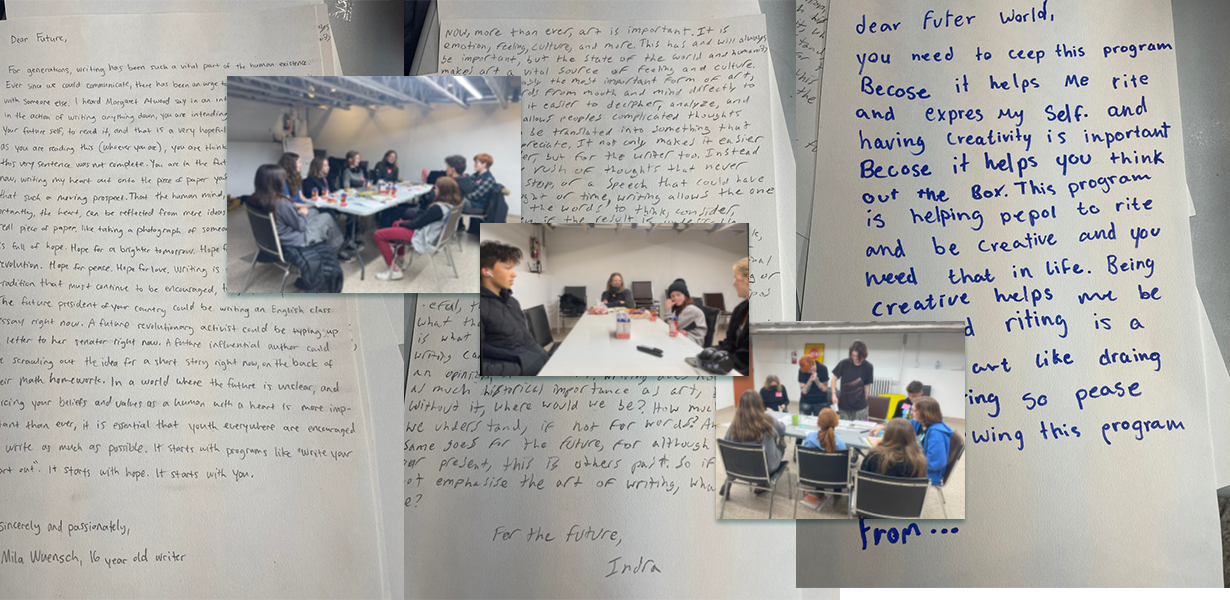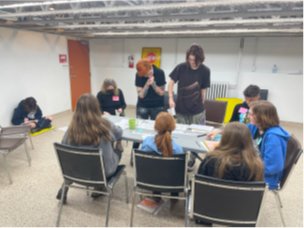Write Your Heart Out: Adapting Evaluation to a Youth Writing Program

Write Your Heart Out (WYHO) is a program for youth 11+ that has, to date, run three times out of the Bus Stop Theatre Co-operative. (The third session is in progress now). It is facilitated and coordinated by a talented and well-known group of writers– Andre Fenton, Meg Hubley and Sue Goyette — and supported by Sebastien LaBelle, the former Executive Director of the Bus Stop Theatre Co-operative.
The WYHO team connected with Inspiring Communities early in their planning to see if we could provide financial support. The concept for the project was deceptively simple: gather youth and get them writing. The facilitators would offer loose guidance, minimal instruction and on-site support, but basically the team’s goal was to create a container that could hold space for youth to explore, through writing, identity, meaning, and whatever other themes they brought with them through writing.
This was a perfect small-scale social incubator opportunity. We had an idea that gathering youth together around some kind of artistic or cultural expression could lead to powerful connections and insight, if the container was right. We had explored this in part with our Dartmouth mural project, wherein we created a healing space for friends of Miya Harris to process their grief and loss in a constructive way, by envisioning a public art project and carrying it out. This mural now bears testimony to Miya’s life and legacy, in North Dartmouth.

The Writing Circle offered a new opportunity to explore how gathering youth for arts-related work could help shift perspectives and build community. We engaged with the WYHO team to talk about the importance of evaluation, especially developmental evaluation. We were less interested in the number of youth attending, and what they produced, than we were in how relationships were being built, in how participants were developing in their understanding of themselves, and what meaning the participants ascribed to the experience.
When we met with the facilitators in January, they shared how they had thought about what we had presented to them in terms of evaluation, and how they had adapted it to suit the participants and the experience they were hoping to build. Sue described a writing challenge they had issued to the participants: to write a letter to the future.
“…the state of the world and humanity makes art a vital source of feeling and culture. Writing is arguably the most vital form of art, as it puts words from mouth and mind directly to paper, making it easier to decipher, analyze and remember.”
“In a world where the future is unclear, and voicing your beliefs and values as a human with a heart is more important than ever, it is essential that youth everywhere are encouraged to write as much as possible. It starts with programs like “Write Your Heart Out.” It starts with hope. It starts with you.”
“Now more than ever, art is important. It is emotion, feeling, culture and more… So, if we do not emphasize the art of writing, what will we be?”
In addition, the team had conducted an internal evaluation, and identified important insights like, “the WYHO experience moves away from outcome to better acquaint its practitioners to the longer, durational creative journey they’ve embarked on?”
They added,
Often, early creative learning has its greatest impact years from now, as participants move into the world with their learning/experience in tow. To ask participants to reflect on learning that is in progress disrupts that progress in ways that may not be helpful in sustaining a creative practice that is especially not concerned with outcome. Protecting the mandate of creating a safe space for young writers to continue to explore and develop their creative writing is key.
The transformative nature of having this space isn’t as concerned with numbers as it is with sustaining the program. Would it be too radical to consider the sustaining of the space successful without counting participants? A relational approach understands that having a consistent space instigates a deep and transformative change in everyone involved.
Tracing how this transformation moves in community is an act of trust for the future.
How would our thinking change if we consider WYHO as the start of something big that requests trust in its process rather than guesses at its anticipatory outcome?
In the Inspiring Communities theory of change, we describe starting with equity at the centre, building capacity in individuals and groups and creating the conditions for change. In capacity building, we talk about not just building knowledge, skills and ability, but motivation for collaboration, introduction to systems approaches, and providing opportunity. The Write Your Heart Out program does all of this, thanks to relational and people-focused facilitation, an adaptable format, and a touch of the magic that writers bring.
Share this:
Comments are closed